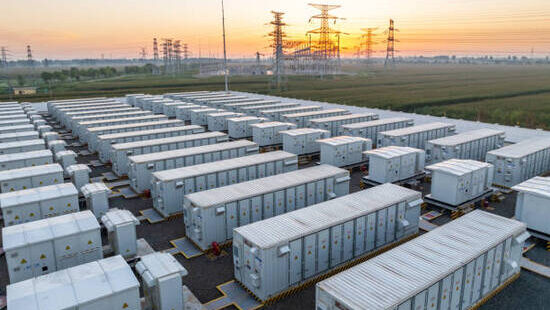
Fluidstack to Build 1GW AI Supercomputer in France: A Landmark Investment in AI and Decarbonized Computing
Fluidstack, a leading AI cloud platform powering some of the world’s foremost artificial intelligence (AI) companies, has taken a monumental step toward revolutionizing AI computing infrastructure. The company has signed a Memorandum of Understanding (MoU) with the French government to construct one of the world’s most advanced and largest decarbonized AI supercomputers. Announced at the AI Action Summit in Paris, this initiative aligns with France’s strategic vision to cement its position as a global AI powerhouse while leveraging its abundant carbon-free energy sources.
The agreement was signed under the leadership of French President Emmanuel Macron and endorsed by key figures in the French government, including Eric Lombard, the Minister of Economy, Finance, and Industrial and Digital Sovereignty, as well as Marc Feracci, the Minister for Industry and Energy. Representing Fluidstack, Co-founder and President César Maklary played a pivotal role in solidifying this ambitious partnership.
This state-of-the-art facility will harness France’s predominantly nuclear energy, ensuring that the AI compute infrastructure is not only powerful but also sustainable. With an initial capacity of 1 gigawatt (GW), the supercomputer is designed to scale beyond this threshold by 2028, significantly boosting France’s AI infrastructure, energy security, and digital sovereignty.
A Bold Vision for AI Leadership
President Emmanuel Macron has been vocal about France’s ambitions in AI. In his statement at the summit, he underscored France’s leadership in the sector:
“France is the leading European country in artificial intelligence. Since 2017, we have trained our talents, developed our research, and strengthened our key players in healthcare, space, defense, and large language models. We have a role to play because our nuclear energy is controllable, safe, stable, and decarbonized—ideal for expanding our AI computing capabilities. This €10 billion agreement with Fluidstack embodies my ambition. We must not slow down because the world is accelerating and the battle for innovation is happening now.”
Key Features and Strategic Goals
The Fluidstack AI supercomputer project is built on a foundation of innovation, energy efficiency, and economic impact. Below are some of the key highlights that make this initiative a landmark development in AI infrastructure:
1. Scalable AI Supercomputing Power
The project’s first phase will involve a €10 billion (USD 10.36 billion) investment, with operations set to commence in 2026. Initially designed with a 1 GW capacity, the facility is strategically positioned for expansion beyond 1 GW by 2028, ensuring that it remains at the cutting edge of AI compute capabilities.
Fluidstack’s supercomputing infrastructure will ultimately host nearly 500,000 next-generation AI chips, providing unparalleled processing power for training and deploying sophisticated AI models. This scale of computing is critical for AI advancements in fields such as natural language processing, generative AI, scientific simulations, and artificial general intelligence (AGI).
2. Commitment to Carbon-Neutral Computing
A core aspect of the project is its commitment to sustainability. France’s low-carbon energy grid, primarily powered by nuclear energy, provides an ideal foundation for AI compute that minimizes environmental impact. The facility will also incorporate waste heat recovery systems, ensuring that excess energy is repurposed effectively rather than wasted.
This approach aligns with global sustainability goals and reinforces France’s commitment to digital and energy sovereignty, setting a precedent for future AI infrastructure projects worldwide.
3. Strategic Energy Partnership with RTE
Fluidstack has secured a critical partnership with Réseau de Transport d’Électricité (RTE), France’s national electricity transmission operator. This collaboration ensures rapid and efficient integration with the country’s high-voltage power grid, enabling a stable and reliable energy supply essential for AI supercomputing at such an unprecedented scale.
With France’s robust nuclear energy infrastructure, Fluidstack’s AI data center will benefit from energy stability, cost-efficiency, and resilience, factors crucial for high-performance AI applications.
4. Economic Growth and Job Creation
Beyond its technological advancements, the AI supercomputer project is expected to have a profound economic impact. It has the potential to generate thousands of high-skilled jobs in AI research, data infrastructure, and cloud computing, bolstering France’s position as an innovation hub.
The initiative will also attract global AI enterprises, startups, and research institutions, creating an ecosystem that fosters AI-driven breakthroughs and commercial applications.
Advancing Artificial General Intelligence (AGI)

Fluidstack’s AI supercomputer is not merely an investment in infrastructure—it is a step towards the future of AI itself. The facility is being purpose-built to train advanced AI models, including AGI, which represents AI systems capable of performing intellectual tasks at human-like levels.
By providing the immense computational resources required to train next-generation AI systems, France is positioning itself among the top three AI hubs in the world, alongside the United States and China. This move will attract AI researchers and companies eager to leverage one of the world’s most powerful AI computing platforms.
France’s Strategic AI Positioning
France’s commitment to AI development extends beyond infrastructure. The country has been steadily investing in AI education, research, and industry partnerships, creating a robust ecosystem that nurtures technological innovation.
1. Education and AI Talent Development
A key pillar of France’s AI strategy is education and workforce development. With a strong emphasis on AI-related courses and training programs in leading institutions, the country is producing a steady stream of highly skilled AI professionals. These experts will be instrumental in maximizing the capabilities of Fluidstack’s new AI infrastructure.
2. AI in Key Industries
The French government has identified several industries where AI is poised to make a transformative impact, including:
- Healthcare: AI-driven medical diagnostics and personalized treatment plans.
- Space Exploration: AI-enhanced satellite data analysis and mission planning.
- Defense and Security: AI applications in cybersecurity, surveillance, and strategic defense systems.
- Language Models: Development of AI-powered translation, communication, and content generation tools.
Fluidstack’s AI supercomputer will serve as a backbone for these industries, accelerating research and deployment of AI solutions.
A Global AI Hub in the Making
With this ambitious project, France is set to become a critical player in the global AI race. The combination of sustainable, large-scale compute power and a thriving AI ecosystem positions the country as a premier destination for AI research and development.
César Maklary, Co-founder and President of Fluidstack, emphasized the significance of this partnership:
“This partnership allows us to rapidly develop the infrastructure needed to support the next wave of AI innovations. Partnering with the French government and global industry leaders, we are creating the most advanced computing capabilities in the world—right here in France. France’s commitment to digital and energy sovereignty makes it the ideal location for such an ambitious project, and I am very proud to be playing a key part in this initiative.”







